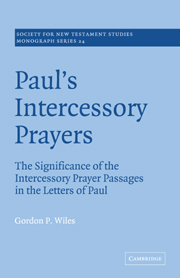 Paul's Intercessory Prayers
Paul's Intercessory Prayers Book contents
- Frontmatter
- Contents
- Preface
- Texts and Abbreviations
- 1 Introductory
- 2 Intercessory prayer material in Paul's letters
- 3 Intercessory wish-prayers: their background and form
- 4 Function of the wish-prayers in I Thessalonians
- 5 Function of the wish-prayers in Romans, I Corinthians, and Philippians
- 6 Blessings and curses
- 7 Intercessory prayer-reports: their form and function
- 8 Function of the prayer-reports in the thanksgiving periods
- 9 Function of the prayer-reports in the body of the letters
- 10 Requests and exhortations about intercessory prayer
- 11 Concluding statement
- Appendixes
- Bibliography
- Index of passages cited
- Index of authors
- Index of subjects
9 - Function of the prayer-reports in the body of the letters
Published online by Cambridge University Press: 30 October 2009
- Frontmatter
- Contents
- Preface
- Texts and Abbreviations
- 1 Introductory
- 2 Intercessory prayer material in Paul's letters
- 3 Intercessory wish-prayers: their background and form
- 4 Function of the wish-prayers in I Thessalonians
- 5 Function of the wish-prayers in Romans, I Corinthians, and Philippians
- 6 Blessings and curses
- 7 Intercessory prayer-reports: their form and function
- 8 Function of the prayer-reports in the thanksgiving periods
- 9 Function of the prayer-reports in the body of the letters
- 10 Requests and exhortations about intercessory prayer
- 11 Concluding statement
- Appendixes
- Bibliography
- Index of passages cited
- Index of authors
- Index of subjects
Summary
Having examined the prayer-reports that form an integral part of Paul's thanks-giving periods, we must consider the functional significance of some less formal prayer-reports – two in the body of II Corinthians and two in Romans.
TWO PRAYER-REPORTS IN THE BODY OF II CORINTHIANS – 9: 14; 13: 7, 9b
We begin with the two that occur near the end and in the middle of II Corinthians:
But we pray God that you may not do wrong – not that we may appear to have met the test, but that you may do what is right, though we may seem to have failed…. What we pray for is your improvement.
(13: 7, 9b)while they long for you and pray for you, because of the surpassing grace of God in you.
(Thanks be to God for his inexpressible gift!) (9: 14f.)As we try to place these prayer-reports within their original epistolary context, we are confronted by some of the more tangled problems in Pauline studies. By comparison with the first letter to the Corinthians, the second is a passionately written and uneven document, loosely organized, with breaks of sequence and apparent contradictions of mood and sense. Its generally fragmented structure is reflected in the scarcity of the intercessory prayer passages and their seemingly disconnected character. Thus to understand their real significance, we must come to some conclusions about the composition of the letter and the circumstances behind the various segments.
- Type
- Chapter
- Information
- Paul's Intercessory PrayersThe Significance of the Intercessory Prayer Passages in the Letters of St Paul, pp. 230 - 258Publisher: Cambridge University PressPrint publication year: 1974


